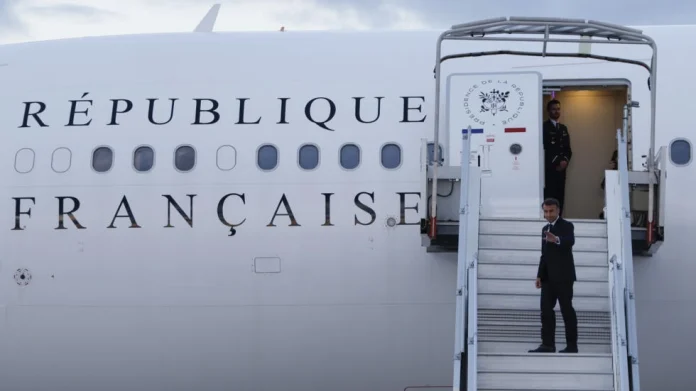French President Emmanuel Macron is travelling to New Caledonia on Wednesday in a bid to stem the unrest and turmoil that has gripped the colony for the past eight days, French media reported.
Macron said the main goal is to “appoint a dialogue mission” to resume political talks with all stakeholders and find a “political solution” to the crisis. Macron’s spokeswoman Prisca Thévenot said a “return to order” was a precondition for any talks.
Unrest has continued for a second week in France’s Pacific territory, despite Macron imposing an emergency decree last Wednesday. The riots, involving mostly indigenous Kanak youths, have devastated the island’s capital, Nouméa. By Friday, five people had been killed, three Kanak youths and two gendarmes.
The day mass protests started
The riots began after France’s National Assembly passed a constitutional amendment allowing French people who have lived in New Caledonia for 10 years since 1998 to vote in provincial elections and in the 54-member Congress. The move is opposed by pro-independence leaders who say it would dilute the votes of indigenous Kanaks, who make up more than 40 per cent of the country’s population.
The protests, involving thousands of Kanaks, have met with brutal repression from the French state and clashed with pro-France armed vigilantes. Police have already arrested 230 people. The state of emergency, imposed for 12 days, gives authorities broad powers to ban gatherings, impose travel bans, carry out house arrests and searches.
A contingent of 1,000 French police and army troops arrived in the city on Friday, bringing the armed security forces to 2,700, including riot and crowd control squads.
Media reported over the weekend that there was an “alarming calm” in Nouméa’s suburbs, with scenes of violence, arson and unrest continuing on Friday. However, despite the military-police crackdown, law enforcement authorities never regained control of the capital’s central neighbourhoods, with fires and other destruction occurring on Saturday night.
France’s High Commissioner Louis Le Franc claimed:
“With massive reinforcement, we will soon be able to regain control of these areas.”
But Nouméa’s mayor, Sonia Lagarde, said while overnight violence had eased due to a 6 p.m. to 6 a.m. curfew, “we are far from a return to normal.” She also added:
“The situation is not improving, quite the contrary, despite all the appeals for calm.”
The riots are spreading with fresh vigour
Meanwhile, the unrest has spread to rural areas. A sixth person was reported dead on Saturday, killed near the town of Kaala Gomen, 355 kilometres north of the capital, in a shootout at one of the many barricades blocking roads on the island. Le Franc said security forces would carry out “pursuit” raids to retake other parts of the territory held by pro-independence groups.
On Monday, Macron said there was “clear progress in restoring order” while authorising the deployment of the military to reinforce police guarding public buildings in Nouméa.
French left-wing spokesman Jean-Luc Mélenchon on X retweeted a post by Manon Aubry of La France Insoumise:
“New Caledonia is an illustration of Macron’s method: brutality and the use of force turning to violence. The best sign of appeasement would be to withdraw the bill and negotiate with all parties concerned.”
The amount of damage suffered by businesses in New Caledonia during the riots exceeded 1 billion euros. 200 facilities where more than 2,000 people worked burned and destroyed, the Chamber of Commerce and Industry said.
The governments of Australia and New Zealand on Tuesday began sending military aircraft to evacuate their citizens after French authorities authorised the landing at the national airport. The foreign ministers of Australia and New Zealand had earlier contacted their French counterparts to “take action” on the delays.
France remains determined to strengthen its grip on the colony. As the US and its allies prepare for war with China, French imperialism is keen to play its part in militarising the Pacific. New Caledonia is home to a major French military base and also holds nearly a quarter of the world’s nickel reserves, essential for stainless steel production and the arms industry.
